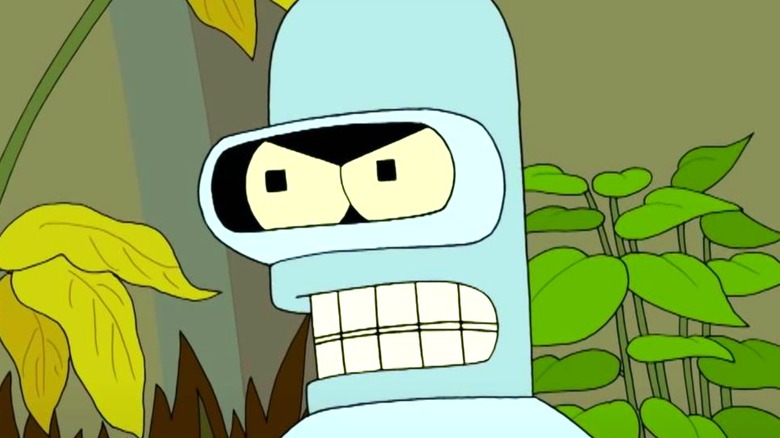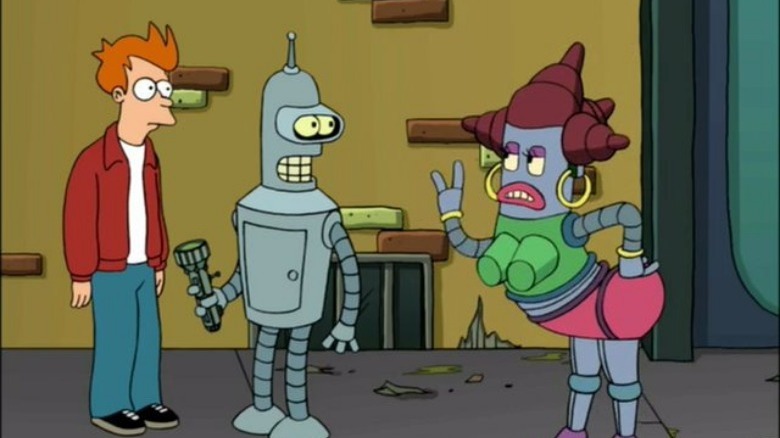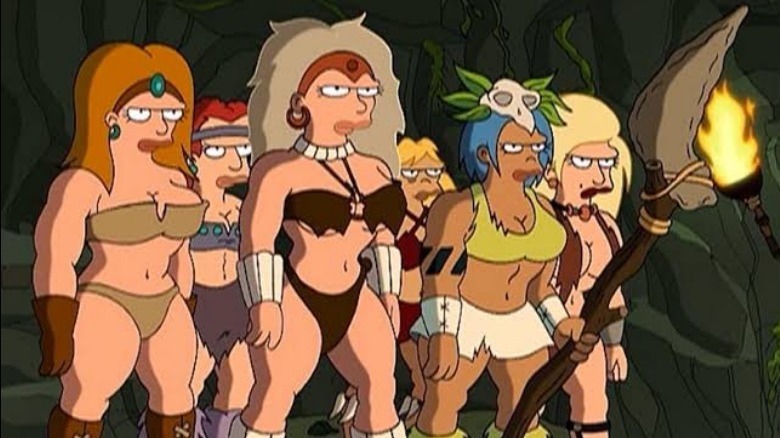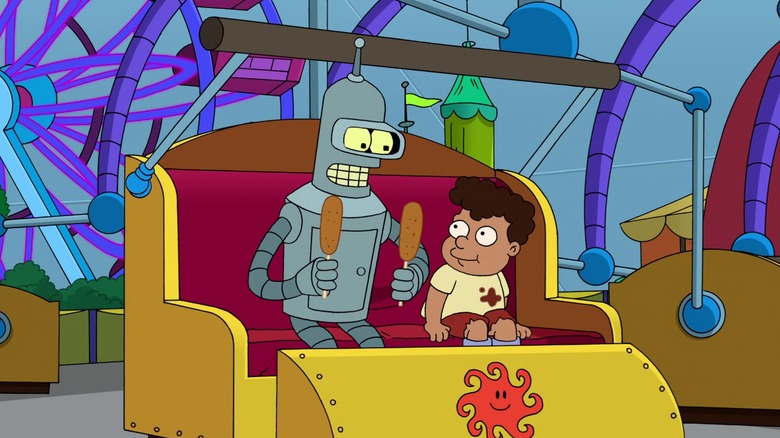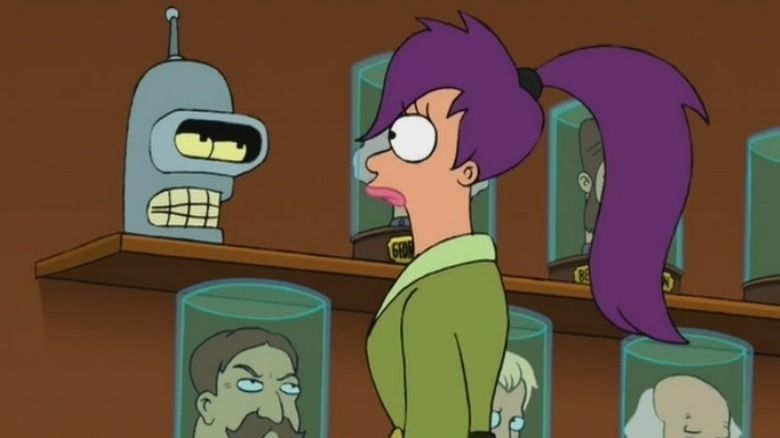Bender Quotes From Futurama That Haven't Aged Well
Comedy has a short shelf life. Society moves on, and jokes hit different. Whether it's because technology has changed, a famous person isn't famous anymore, or because cultural attitudes have progressed, jokes can fall flat. Even "Futurama," a show ostensibly set in the future, can feel outdated as time marches on.
Created by Matt Groening and David X. Cohen, "Futurama" started life on Fox. After being canceled, the show found a new audience on Cartoon Network's Adult Swim block. From that success came a series of straight-to-DVD movies, and new seasons on Comedy Central. "Futurama" finally ended, for like the fourth time, in 2013. The show focused on Philip J. Fry, a 20th-century delivery boy who is frozen for 1,000 years. Waking up in New New York of 2999, he winds up working at Planet Express. Joining him in his futuristic delivery trips are his captain/love interest Leela, and best friend Bender.
Bender Bending Rodriguez is, as his name suggests, a bending robot. Voiced by John DiMaggio, he is lewd, crude, and rude. Bender was the comedic sociopath of "Futurama," whose main objective in every scene was to do the most depraved and immoral thing possible. "Futurama" was gentler than much of 2000s comedy, with regards to the treatment of protected classes or "ironic" offensive material. But even so, there are some jokes that feel different today.
'That's no lady!'
In "Fry & the Slurm Factory," Fry and Bender get an F-Ray, which allows them to see inside any object. While pointing it at random things on the street, Bender aims it at a robo-woman, only to be shocked when something inside the woman suggests that she wasn't built female. "That's no lady!" he yells, to which the fembot (also voiced by John DiMaggio) responds, "Damn, chico! One more upgrade and I'll be more of a lady than you can handle." The Talking Futurama podcast laments the exchange in their recap episode, noting that it is "of the era," and with Henry Gilbert saying, "I am glad that the trans robot gets the last laugh."
This interaction is problematic on many levels: Bender is acting transphobic, as are the writers by casting a cisgender man in the role of a trans robot. But it also raises lots of worldbuilding questions: why did humans make robots sexually dimorphous in the first place? Is the (horrifically named) Hermaphrobot programmed to feel uncomfortable in their assigned gender, and if so, to what end? Why does this robot need multiple upgrades to become a fembot, when Bender is able to transition in a later episode in a matter of minutes?
Everything on Planet Amazonia
"Futurama" is home to a lot of cringey "battle of the sexes" humor. Considering how few women were on staff as writers, you'd think maybe they'd leave well enough alone. But in "Amazon Women in the Mood," we get a lot of jokes about how a world run by women would be different. For one thing, their basketball teams don't dunk — which makes no sense, as the average Amazonian is bigger than any NBA player. The Amazonians have a comedy club, where the humor comes "from character, real situations," and not from "abstract craziness." This doesn't please the men. "Translation: Boring!" says Bender, who gets his head bashed in for sassing off.
Bender's dig at female comedy falls into what The Mary Sue calls "The 'Misogyny Slap' Gag." It's a way for writers to have their misogynist cake and eat it too. A man can say something awful, and he gets punished on-screen for saying it. But the writers get to tell their sexist joke anyway. "[W]hy is the only proper response to sexist comments an act of violence," they wrote, "and why are we laughing at a woman acting violently for a legitimate hurt that shortchanged her personhood?"
'Want a corn dog? Then your mom should have bought you one.'
"Meanwhile," the final series finale, kicks off at Luna Park — the amusement park on the moon where the Planet Express crew shipped their first delivery. While chilling on the rides, Bender gets on a scrambler-type ride with Albert. Holding two corn dogs, Bender asks Albert if he wants one. When Albert says he does, Bender replies "Then your mom should have bought you one." This seems like normal Bender comedic sociopathy until you remember that he and Albert have a past.
In Season 3's "The Cyber House Rules," Bender adopts a whole batch of orphans from Leela's old Orphanarium, including Albert. Bender knows for a fact that Albert doesn't have a mom. "So does Bender not remember Albert," asked Redditor u/h8xwyf, "or is he just being an a**hole?"
Bender's comments are even harsher when you remember that he only adopted the kids in order to collect a government stipend. Bender discovered that, when even feeding the kids burgers made from cats, his orphan scheme is operating at a loss. What's his solution? To sell the kids as meat to a Chinese restaurant. Besides feeding into racist stereotypes about the quality of meat in Chinese restaurants, child killing is a new low for Bender.
On Reddit, u/swesus noted the final twist of the knife in the Bender/Albert scene: "Just think about this... BENDER CANT TASTE OR DIGEST THE CORNDOGS."
No. Convicted felon.
This line isn't offensive in hindsight, it's just factually inaccurate now. In "A Head in the Polls," Bender says he's not allowed to vote in the Earthican presidential elections because he is a convicted felon. But felons can vote in the city of Old New York. In 2021, legislation was passed that allows all felons to vote after incarceration (per NBC News). Felons' are automatically re-enfranchised upon release. They do, however, have to re-register to vote.
Now, it's possible that voting rights were eroded in the 979 years between this law's passage and the 3000 election of Richard Nixon's head. New York was rebuilt twice in that time, and the entire planet was united under one Earthican government. We also have evidence that certain freedoms were lost over 1,000 years. At the political convention in the episode, Amy speaks to a party rep whose sole platform is the legalization of hemp. Hemp was legalized in 2019, per CNN. In the time since the episode aired, medicinal and recreational marijuana use has been legalized in many states. So clearly something happened to erode those rights by the year 3000. And since "A Head in the Polls" came out, the Voting Rights Act has been essentially "gutted," according to NPR. It's plausible that felons were disenfranchised again when one of the main defenses of voting rights had been all but struck down.
